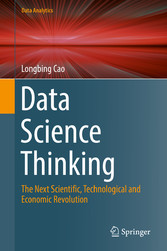Suche
Lesesoftware
Specials
Info / Kontakt
Data Science Thinking - The Next Scientific, Technological and Economic Revolution
von: Longbing Cao
Springer-Verlag, 2018
ISBN: 9783319950921 , 390 Seiten
Format: PDF
Kopierschutz: Wasserzeichen



Preis: 74,89 EUR
eBook anfordern 







